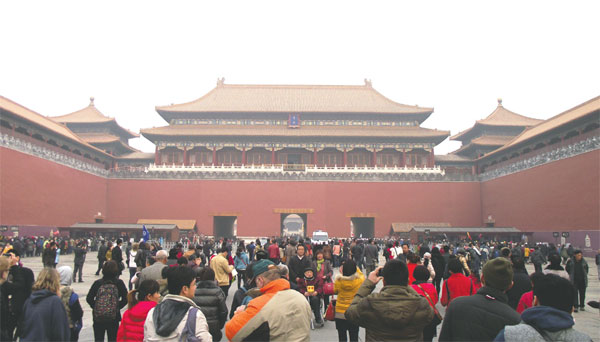News in review Friday, January 23 to Thursday, January 29
Updated: 2015-01-30 11:37
(China Daily USA)
|
||||||||
Friday - January 23
Bacon smoking in public areas banned
Worsening air pollution has prompted the governments of two cities in Sichuan province to ban bacon smoking, and officials are being sent to urban areas to enforce the order.
It is a time-honored custom for people in Sichuan to eat bacon during Spring Festival, which falls on Feb 19 this year. But many residents had complained about the unpleasant smell produced in public spaces by bacon smoking, and they asked that it be banned
It has been banned in Dazhou, the easternmost city in Sichuan, and the neighboring city of Bazhong. (Photo 1)
Third-party to assess rush at Spring Festival
Third-party assessments will be made of the performances of China's transportation departments during the annual Spring Festival travel peak, or chunyun, according to a senior official.
These institutions will seek public opinion through websites to evaluate the work of government bodies on ticket sales, publicizing information, as well as looking at the operation of railway stations and airports.
Results of the evaluations will be used to help improve transportation departments' performances during the chunyun travel period.
Chinese tradition holds that people should return home and spend Spring Festival, the most important Chinese feast day, with their families.
This creates an annual travel rush that is the world's largest recurrent human migration. During the travel peak in 2014, Chinese people made more than 3.6 billion trips, the majority by road and others by rail, air and ship.
Spring Festival falls on Feb 19 this year. (Photo 2)
Monday - January 26
Smaller offices for ministers, provincial governors
China's anti-graft body has put a limit of 54 square meters on offices for ministers and provincial governors.
Their deputies' offices will be 12 square meters smaller, said the Communist Party of China's Central Commission for Discipline Inspection (CCDI).
Luxury and spacious offices by Chinese officials have caused public outrage for years and became a target in the current anti-corruption drive.
And there are limits on private toilets. Ministers and provincial governors shall have them as long as the offices meet the new size requirements. But deputies are not allowed to have private toilets, according to the official document.
Internet users say 'no' to editing cleavage
Nearly 95 percent of Internet users in China disapprove of the removal of scenes showing cleavage in a Chinese television drama, calling the move "unnecessary".
The drama,The Empress of China, also known as the Saga of Wu Zetian, was removed from commercial satellite station Hunan TV for "technical reasons" in late December.
When it returned to the screen in January, scenes showing female characters' cleavage were removed and replaced by close-up shots of the actresses' heads.
In a survey conducted by SinaWeibo under the topic Cleavage scenes cut, yes or no? more than 95 percent of viewers voted "No" whereas only 5 percent voted "Yes".
A senior official from China's television regulator said on Jan 21 that "unhealthy images" for minors was why the show was edited.
Tuesday - January 27
Foreign Internet firms told to obey laws
Foreign websites must abide by Chinese laws and its Internet management policies if they want to operate in the country, a top official said.
Wen Ku, director of the telecom department at the Ministry of Industry and Information Technology, said the rapid development of the Internet is forcing China to come up with new measures to maintain cybersecurity and steady growth.
"The country needs new methods to tackle new problems ... the development of the Internet has to be in accordance with Chinese laws," he said at a news conference in Beijing.
The Internet sector in China is the biggest in the world with about 650 million users.
Wen's comments follow reports that China recently blocked access to several virtual private networks, a service that allows users to access websites that are currently unavailable on the Chinese mainland.
Three VPN providers - Astrill, StrongVPN and Golden Frog -claimed last week that their services had been disrupted and were unavailable for users on the Chinese mainland.
Actress and husband buy 9% of Alibaba Pictures
Chinese actress Zhao Wei and her husband have acquired nearly a 9.2 percent stake in Alibaba Pictures Group for HK$3.1 billion ($400 million).
Zhaowei and Huang Youlong became the company's second-largest shareholder on Tuesday, according to a Hong Kong exchange filing, after acquiring 1.93 billion shares of Alibaba Pictures at an average price of HK$1.6 each in December last year.
The company issued a profit warning on Monday, saying that it expects to record a substantial loss of as much as HK$600 million for the 2014 fiscal year due to production delays, asset impairment provisions and decrease in its magazine advertising revenue.
The 39-year-old pop star established her acting career with the TV drama Princess Huanzhu in 1998, and she is also a film director. (Photo 3)
Wednesday - January 28
Shanghai wants more babies
Family planning officials in Shanghai have called on the city's residents to have more babies as an unexpectedly small percentage of couples have sought permission for a second child despite the relaxation of China's one-child policy.
Fan Hua, of Shanghai's Municipal Commission of Health and Family Planning, said 90 percent of the city's women of child-bearing age are allowed to have a second baby, but only 5 percent have submitted applications, the Qianjiang Evening News reported.
The official said the high cost of raising children and women's fear of an abrupt halt to their career development are the major reasons behind the unusually small number of applications.
China amended its one-child policy in December 2013, allowing couples to have a second baby if either parent is an only child.
According to the Beijing Municipal Commission of Health and Family Planning, since the capital relaxed its policy, around 30,000 couples have submitted applications for a second child, while the city had expected an extra 50,000 annually.
Police being investigated in journalists beating
Policemen in south China's Guangdong province are under investigation after allegedly beating undercover journalists covering an official dinner that apparently flouted the country's ban on extravagant meals.
Journalists with Southern Metropolis Daily were going to report on public security officials feasting in a high-end restaurant in Shenzhen last week.
The paper said the reporters were beaten and robbed of their mobile phones and cameras, and that police who arrived at the scene later helped the officials get away.
The 28 people were served giant salamander, which is a protected animal in China.
But police say what they had at the dinner was artificially-bred.
It has not revealed who paid for the dinner.
Thursday - January 29
Young Chinese fourth-highest earners in Asia
Young Chinese earn on average $1,358 per month, placing them fourth in salaries in Asia, according to a recent survey by Japanese news agency Nikkei.
Young professionals from Singapore, South Korea and Japan on average get the top-three highest wages in Asia, said the study conducted for the first time. The survey covered 2,000 interviewees from 10 Asian countries between the ages of 20 and 30, according to Nikkei.
Singaporeans earn an average of 19,085 yuan ($3,169) per month, while young professionals in Vietnam rank the bottom with an average of $338 per month.
According to Nikkei, 83 percent of young Chinese have credit cards and 62 percent of young Malaysians have taken loans from financial institutions.
Yuan moves into top-five currency rank
The yuan has moved into the top five among world payment currencies, surpassing the Canadian and Australian dollars by value, according to the Society for Worldwide Interbank Financial Telecommunication.
In December, the Chinese currency reached a record high share of 2.17 percent in global payments by value, rising from 0.63 percent in January 2013.It now trails the Japanese yen which has a share of 2.69 percent. (Photo 5)

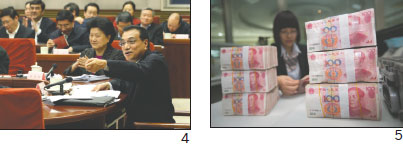
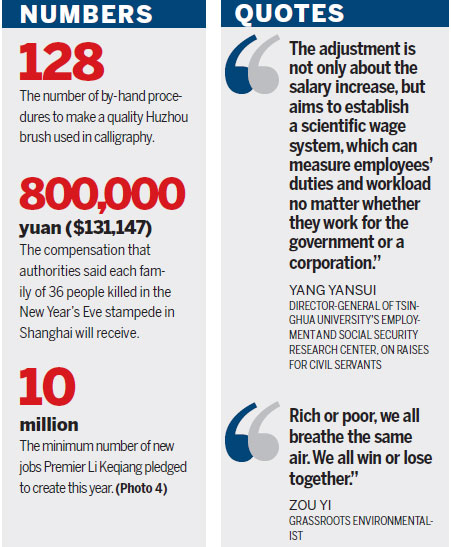
|
The Palace Museum in Beijing may limit the number of daily visitors to 80,000 after dealing with overwhelming crowds for years. The proposal is awaiting approval from various authorities that have jurisdiction. No specific date to kick off the new policy was announced. More than 15 million people visited the Palace Museum in 2014, topping all museums in the world. Zhen Huai / Asianewsphoto |
|
Students of an art school in Liaocheng of east China's Shandong province on Jan 22 dressed up as cell phones and called for more face-to-face communication. Zhang Zhenxiang / Asianewsphoto |
(China Daily USA 01/30/2015 page8)
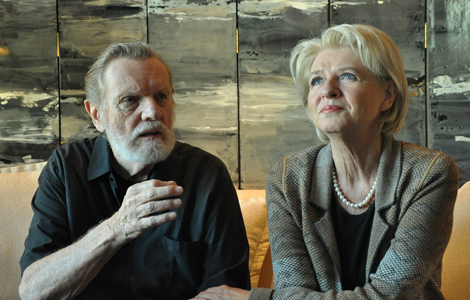
 US futurist touts the rise of the "Global Southern Belt"
US futurist touts the rise of the "Global Southern Belt"
 Ten surprising facts about Jack Ma
Ten surprising facts about Jack Ma
 Gas blast at Mexico City children's hospital kills 7, injures 54
Gas blast at Mexico City children's hospital kills 7, injures 54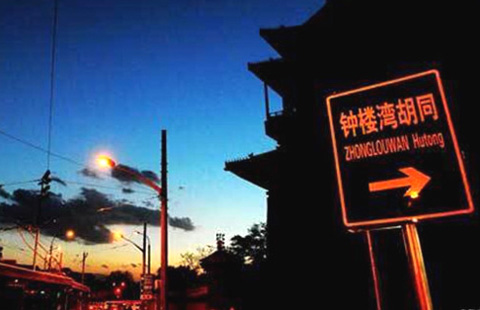
 Ten characteristic streets in Beijing
Ten characteristic streets in Beijing
 Outgoing US Defense Secretary Hagel lauded at farewell
Outgoing US Defense Secretary Hagel lauded at farewell
 Don't have to be a queen to live in frozen wild of snow
Don't have to be a queen to live in frozen wild of snow
 Across Canada Jan 30
Across Canada Jan 30
 New consul general greeted
New consul general greeted
Most Viewed
Editor's Picks

|

|

|

|

|

|
Today's Top News
US futurist touts the rise of the "Global Southern Belt"
Chinese brands derive rising revenue proportion overseas
Mongolian culture to highlight New Year's concert
Alibaba quarterly revenue disappoints, shares fall
'Nightmare' incompatible with China-US relations
Alibaba adjusted profit tops estimates, revenue falls short
US ambassador to China calls for Flying Tigers movie
Taobao locks horns with regulator
US Weekly

|

|
